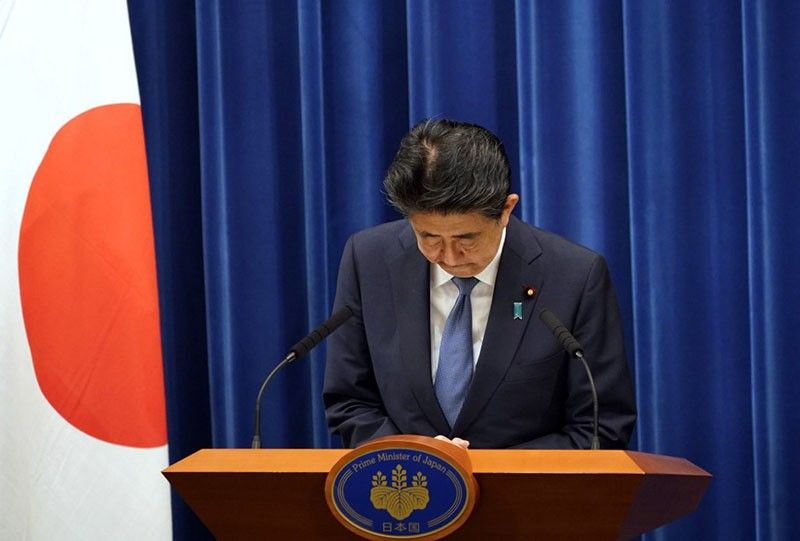Who could lead Japan after Shinzo Abe?

TOKYO, Japan — As Japan's Prime Minister Shinzo Abe announces his plans to resign over health problems, attention turns to who could succeed the country's longest-ruling premier, with no consensus yet clear on a candidate.
Here are some of the potential contenders:
Taro Aso, gaffe-prone finance minister
In his dual role as finance minister and deputy prime minister, 79-year-old Taro Aso is a Liberal Democratic Party old-timer.
A close Abe ally, Aso was prime minister from 2008-09 and has been deputy prime minister and finance minister since 2012.
Aso stepped down as premier after his ruling LDP was booted from office in a historic defeat in 2009, and has long been rumoured to nurse hopes of another chance at the top office.
His long political career has been punctuated by repeated gaffes, including comments that the elderly should "hurry up and die" instead of costing the government money, and that Tokyo could learn from Nazi Germany when it comes to constitutional reform.
But he has weathered the multiple furores over his comments, and leads a major faction in the LDP.
He backed a massive stimulus programme in the face of the 2008 global financial crisis, but later shifted to stressing the importance of reducing the country's snowballing debt.
Shigeru Ishiba, popular ex-defence minister
Former defence minister Shigeru Ishiba is considered a military geek but is also a self-confessed fan of 1970s pop music.
The 63-year-old former banker is the scion of a political family and seen as a strong orator with significant experience -- he entered parliament at just 29.
Like Abe, Ishiba is a defence hawk who wants to strengthen the role of the country's Self-Defense Forces in the pacifist constitution, and he has even mused about whether Japan should reconsider its policy forbidding nuclear weapons on its soil.
He has served in several cabinet posts and is a popular choice to succeed Abe among the public.
Ishiba is less favoured by his fellow ruling party lawmakers, partly because he once left the LDP.
He was the sole challenger to Abe in the party's 2018 leadership contest and was heavily defeated.
Yoshihide Suga, power player and adviser
Yoshihide Suga, 71, rose to national prominence as a trusted Abe adviser and was a key proponent of his bid for the premiership after a disastrous first term.
After Abe returned to power in 2012, he appointed Suga chief cabinet secretary, a powerful position that coordinates the efforts of government ministries and the ruling party.
He is also often the face of the government, delivering regular press briefings and famously revealed the name of the new imperial era declared with the ascension of Emperor Naruhito in 2019 -- the Reiwa era.
He is a rare self-made lawmaker in a ruling party filled with hereditary politicians and former technocrats, and is the eldest son of a strawberry farmer.
Suga moved to Tokyo after high school and worked odd jobs to put himself through night college.
He was first elected in 1987, as a municipal assembly member in Yokohama, and won a lower house seat in 1996.
Fumio Kishida, favored successor
Former foreign minister Fumio Kishida currently serves as the ruling party's policy chief and is often described as Abe's preferred successor, but his soft-spoken, low-key presence and alleged lack of charisma are seen as possible obstacles.
Elected from Hiroshima, Kishida worked to invite then-US president Barack Obama for a historic visit to the city that was devastated by the world's first war-time atomic bomb explosion.
He has been credited with helping cement a deal between Japan and South Korea in 2015 that was meant to end the long-running dispute between the countries over the use of sex slaves during Japan's occupation.
Taro Kono, colorful Twitter user
Defence Minister Taro Kono was once considered an ambitious and independent-minded political reformer, but the 57-year-old has toned down his rhetoric in recent years as a key member of Abe's cabinet.
After a stint as a government reform minister, Georgetown-educated Kono served as foreign minister between 2017-2019 before becoming defence minister.
He travelled extensively as Japan's top diplomat, but also oversaw the deterioration of ties with South Korea over unresolved wartime disputes.
In recent years, he has largely avoided discussing his passionate opposition to nuclear power, given the government's official support, and despite his independent image he is seen as close to both Aso and Suga.
Often contrasted with his father, political dove Yohei Kono, he has also set himself apart with his online presence, maintaining personal Twitter accounts in Japanese and English.
- Latest
- Trending

































